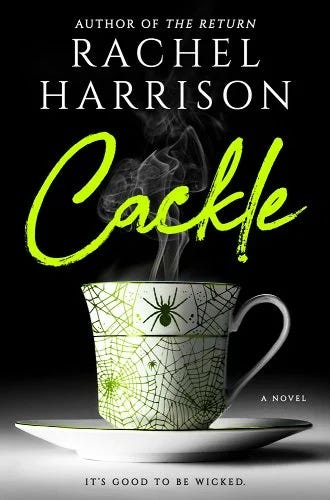It all started with a book I read a few weeks back, one of those that goes on bouncing around inside my head long after I finished the last page. Cackle, by Rachel Harrison, is the story of Annie, who moves to a small town in upstate New York after her boyfriend dumps her. In Rowan, she meets Sophie, who’s beautiful, kind, talented and a little mysterious. Also, everyone else in town seems a little afraid of her.
You can probably guess where the book goes from there, given the title. Suffice to say, there are witches. I’ll come back to that.
The book made me think a lot about the nature of gender and femininity and friendships.1 Annie is ecstatic to have a friend, but Sophie is so amazing that she seems too good to be true. Can Sophie really want to be friends with her? Can women really be friends like this? Does Sophie have some ulterior motive? Is it possible to find that much happiness just in friendship with another woman?
When I used to ask my students to describe one thing they didn’t like about their own gender, one of the most common answers among the women in the class was cattiness. “Girls are mean to each other,” they would say.
“Are they really?” I would challenge them. “Or is that just what the patriarchy wants you to believe?”
Then I would assign them Roxane Gay’s essay, “How to Be Friends With Another Woman.” That Gay felt that essay needed to be written suggests that the women in my classroom weren’t all wrong.
There’s nothing inherent in women that makes them catty, but women are taught to distrust other women and there’s nothing coincidental about that. The cishteteropatriarchy wants women—all types of women—to be isolated from each other. Black women from Asian women. City women from country women. Trans women from cis women. Keeping us apart works quite well for the powers that be.
So we all become a little bit like Annie in the novel, trying very hard to create a version of herself that pleases other people (and especially her asshole ex-boyfriend), while being suspicious of the perfectly wonderful woman who appreciates her exactly as she is—Sophie. Sophie who is totally honest about who she is. Who doesn’t smile when she doesn’t feel like smiling. Who has gifts and talents and abilities that she isn’t ashamed of. A woman who is terrifying to the townspeople because women who are in full control of themselves are, in fact, terrifying.
We please other people and ignore the amazing witch standing right beside us. The person who see the witch waiting inside.
The novel suggests that any woman can become a witch. Or maybe everyone? The details aren’t clear, but you become a witch when you surrender. You just surrender to the power that’s already inside you. And for weeks afterward, I wondered, yeah, what would that feel like? What would it feel like to fully surrender? To embrace my inner witch?
I think it would mean giving so many fewer fucks about all the stupid things the world has worked very hard at convincing me I should give a fuck about. Every time I assert myself in my job in a way that isn’t all pink and sugar-coated, are people seeing me as a bitch? Nope, don’t give a fuck about that anymore. Is it too pushy and conceited to promote myself and my writing in the world? Oh, yeah, giving that up. Does this shirt make me look fat? Zero fucks given.
Sophie’s witchiness takes the form of living out in the woods by herself. I can see the attraction there. To be alone is a radical act for a woman in a world where you’re defined by your relationships—mother, daughter, wife. Still, I think I’d prefer to be a town witch, surrounded by cats. Sophie gardens and makes things and takes care of her community, even if they resent her for it. I can get behind all of that. She is a witch who shares her power with others. Who even after years of persecution (there’s a graveyard filled with the bodies of her witchy sisters), hasn’t given up on reaching out. Yeah, that’s a witch.
The world works so hard to convince all of us—not just women—that we are small and powerless and not good enough in all the ways. The power of being a witch is the power of refusing all of that. Of throwing your leg over your broomstick and letting all the fucks you no longer give become a bright, shiny trail of fire streaked across the sky.
Yeah, I definitely want to be a witch.
Hurray! We did it! We crossed the 100-subscriber mark! I now have “hundreds” of subscribers (102 to be exact, but who’s counting?). Thanks again to everyone who signed up. It’s so appreciated! Please keep sharing and liking and commenting. I love hearing back from people.
Also, local folks, don’t forget to sign up for one of my winter writing workshop classes. The first class is almost a week away now on November 23. These are very laid back affairs. You don’t have to be a writer or have written. Just bring your creativity and something to write with. Get your tickets here.
I’m a sucker for stories that use the supernatural to tell us stories about real life. This is what made Buffy the Vampire Slayer so awesome—using vampires and witches and demons and hellmouths to tell stories about what it’s like to be in high school and then college and then your 20s. See “Living Conditions,” in which Buffy’s first-year college roommate seems like a demon, and then turns out to actually be a demon.


